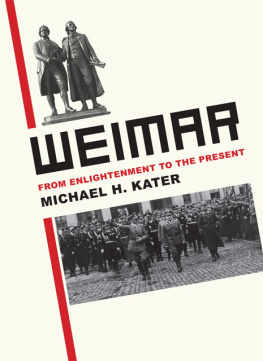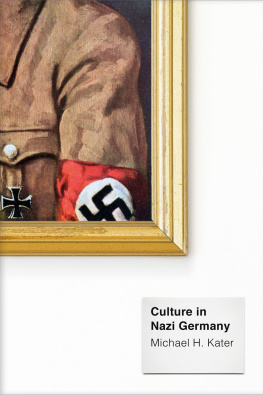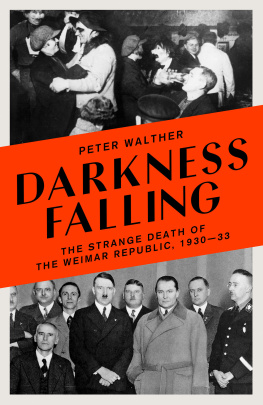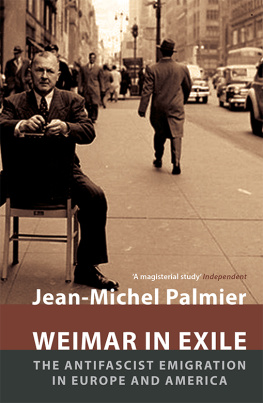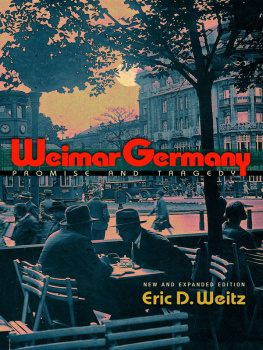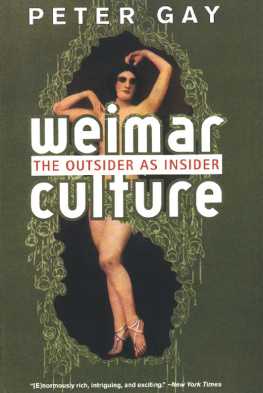
Other Books by Michael H. Kater
Das Ahnenerbe der SS, 19351945: Ein Beitrag zur Kulturpolitik des Dritten Reiches (Deutsche Verlags-Anstalt, 1974)
Studentenschaft und Rechtsradikalismus in Deutschland, 19181933: Eine sozialgeschichtliche Studie zur Bildungskrise in der Weimarer Republik (Hoffmann & Campe, 1975)
The Nazi Party: A Social Profile of Members and Leaders, 19191945 (Harvard University Press, 1983)
Doctors under Hitler (University of North Carolina Press, 1989)
Different Drummers: Jazz in the Culture of Nazi Germany (Oxford University Press, 1992)
The Twisted Muse: Musicians and their Music in the Third Reich (Oxford University Press, 1997)
Composers of the Nazi Era: Eight Portraits (Oxford University Press, 2000)
Hitler Youth (Harvard University Press, 2004)
Never Sang for Hitler: The Life and Times of Lotte Lehmann, 18881976 (Cambridge University Press, 2008)

Copyright 2014 Yale University
All rights reserved. This book may not be reproduced in whole or in part, in any form (beyond that copying permitted by Sections 107 and 108 of the U.S. Copyright Law and except by reviewers for the public press) without written permission from the publishers.
For information about this and other Yale University Press publications, please contact:
U.S. Office:
Europe Office:
Set in Adobe Caslon Pro by IDSUK (DataConnection) Ltd
Printed in Great Britain by TJ International Ltd, Padstow, Cornwall
Library of Congress Cataloging-in-Publication Data
Kater, Michael H., 1937
Weimar : from Enlightenment to the present / Michael H. Kater.
pages cm
Includes bibliographical references and index.
ISBN 978-0-300-17056-6 (cloth : alkaline paper)
1. Weimar (Thuringia, Germany)History. 2. Weimar (Thuringia, Germany)Intellectual life. 3. Weimar (Thuringia, Germany)Politics and government. 4. Social changeGermanyWeimar (Thuringia)History. I. Title.
DD901.W4K38 2014
943'.2241dc23
2014019000
A catalogue record for this book is available from the British Library.
10 9 8 7 6 5 4 3 2 1
For Jonah
Contents
Illustrations
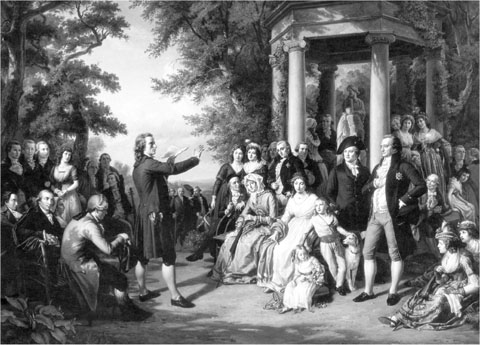
1. The eighteenth-century Weimar Muses Court as imagined by painter Theobald Freiherr von Oer, 1860. Friedrich Schiller is seen reading to a select group of savants and court nobles in Tiefurt, near Weimar. Johann Wolfgang Goethe, with his hand in his vest, is standing to the right. Christoph Martin Wieland is seen communing with a young woman in front of Schiller.
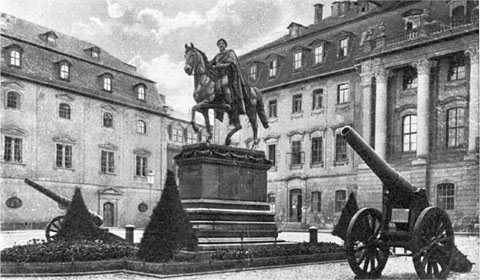
2. The statue of Weimar Duke Karl August, a passionate huntsman, at the Platz der Demokratie. In his time at the turn of the seventeenth century this was the Frstenplatz. On the left is the famous Anna Amalia Library, the former Grnes Schloss, behind the duke a princely residence, the Frstenhaus, today the Franz Liszt Conservatory.
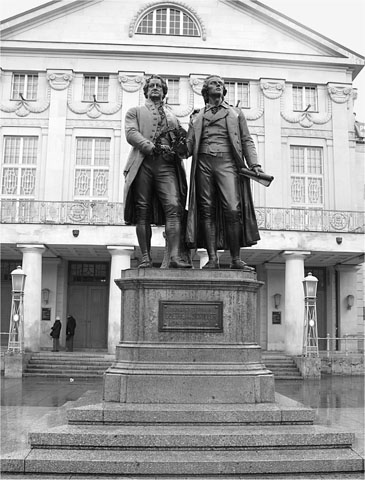
3. The Goethe-and-Schiller statue in front of what is now (2013) the Deutsches Nationaltheater Weimar. The statue was created by the Dresden sculptor Ernst Rietschel for festivities in 1857. The physically taller Schiller has been reduced in size to make Goethe appear equal in height, at the dawn of a Goethe renaissance in the second half of the nineteenth century.
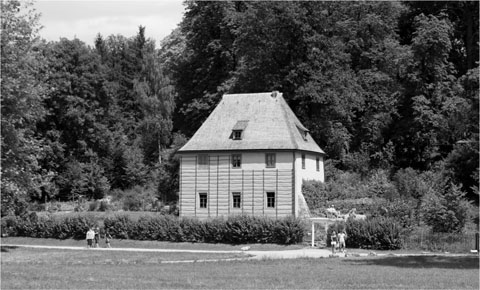
4. Goethe's garden house in the Ilm park as viewed in modern times. It was at this retreat that Goethe, who had designed the park, first met with Christiane Vulpius, and later repeatedly for trysts.
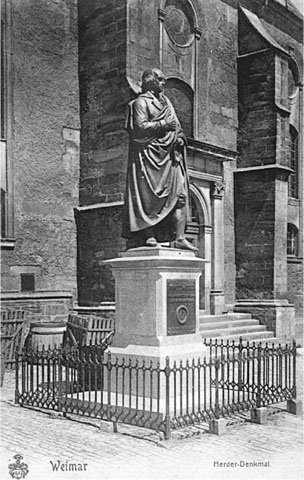
5. The statue of Johann Gottfried Herder, created in 1850 by Ludwig Schaller, in front of St. Peter and Paul's, which colloquially was known as the Town Church or, later, the Herder Church. This is where Herder, as the chief theologian of the duchy, held his sermons.
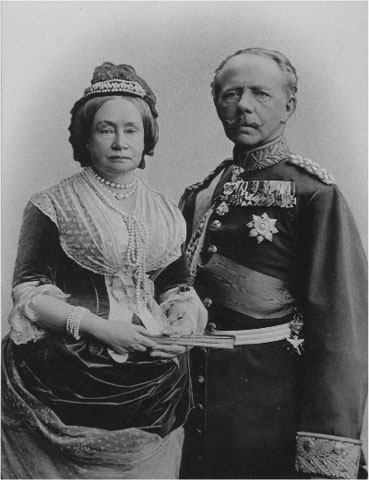
6. Grand Duke Carl Alexander and his, originally Dutch, wife Sophie, on the occasion of their Golden Wedding Anniversary, October 8, 1892. The pious but enlightened couple had commenced their reign in 1853. During his lifetime Carl Alexander was proud that as a child he had sat on Goethe's knees.
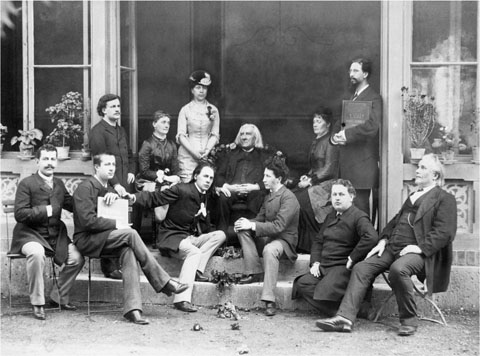
7. Franz Liszt in the 1880s, toward the end of his life, in front of his Weimar residence. He is dressed in the clerical garb of a Catholic abb. Surrounding him are his favorite students at the time. In the front row, Arthur Friedheim sits to his right, and Alfred Reisenauer is the second to his left.

8. Liszt's future son-in-law Richard Wagner, 1861 in Paris. By this time, Liszt's efforts had failed to draw Wagner to Weimar permanently, one of several reasons why he himself left Weimar for Budapest and Rome in 1861. Nonetheless, Liszt had succeeded in premiering Wagner's opera Lohengrin at the court theater in 1850.

9. Weimar court theater director Franz Dingelstedt, a brilliant artist, whom Grand Duke Carl Alexander called to Weimar in 1857, on Liszt's urgings, after Dingelstedt had lost his position in Munich. But because Dingelstedt preferred theater over opera, he ungratefully intrigued against Liszt, thus contributing to the musician's departure in 1861. This portrait is from the 1840s.
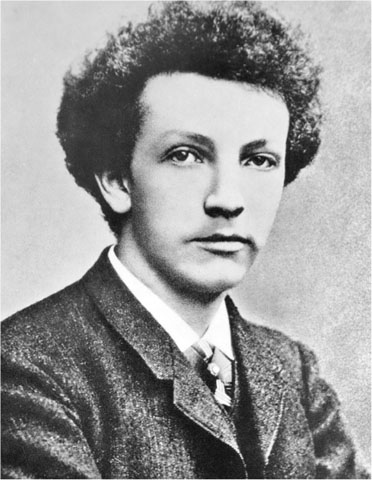
10. Richard Strauss in his early twenties, before his Weimar court appointment in 1889. Once there, he took little interest in town life or the court, concentrating, instead, on music and winning the heart of his lead soprano, Pauline de Ahna. He married her after his stay in Weimar, and after Cosima Wagner in Bayreuth had dismally failed to interest him in her daughter, Eva.
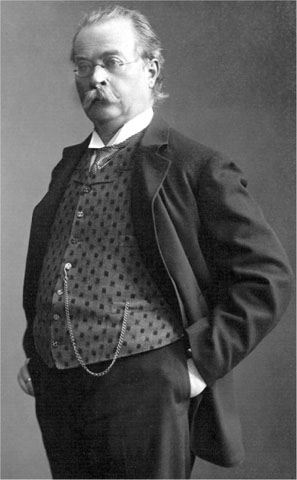
11. The poet Ernst von Wildenbruch, a distant relative of Grand Duke Carl Alexander, who moved from Berlin to Weimar in 1900. As a rabid German nationalist, he was the author of pathetic dramas, not all of which were performed at the Weimar court theater. His influence in Weimar in the early twentieth century signifies a precipitous cultural decline coupled with a rise in chauvinism.
Next page
